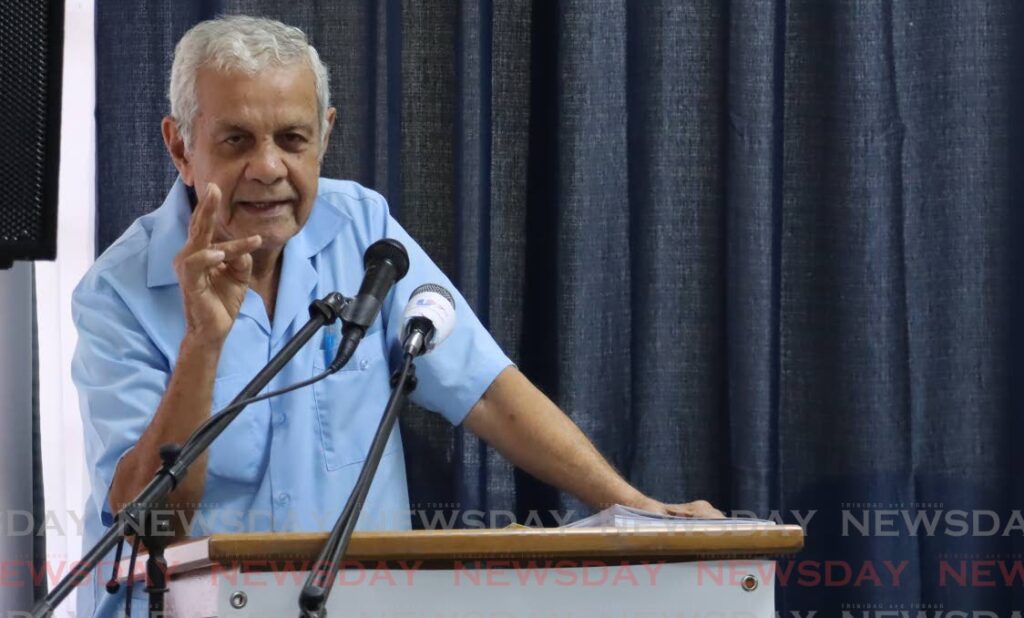Brinsley, a people's historian

Tribute to Prof Emeritus Brinsley Samaroo, who died on July 9, delivered at his memorial service, July 14, Daaga Auditorium, UWI
Prof Emerita Bridget Brereton
At the service for Gordon Rohlehr held right here in Daaga Hall, Ken Ramchand said he never thought that Gordon would die.
I never thought that Brinsley would die. He was a hugely important fixture in my life for well over 50 years – and in the lives of so many others.
We first met around 1968 or 69 when he returned home from London with his newly minted PhD to lecture in history, and I was starting my doctoral research here. We’ve been close ever since.
Brinsley was a well qualified academic historian. He was one of a small group of people who pioneered the scholarly study of the indentured Indian Diaspora. When he started in the early 1970s there wasn’t much quality research on the topic; now it is a huge growth area with new work coming out all the time and younger scholars from all over the place involved.
He had close links to India, where he got his BA and MA degrees and which he often revisited, and he was at the very centre of an active network of researchers from the Caribbean and from other sites of the diaspora.
But no way could Brinsley be described as a narrowly “ethnic” historian. He wrote extensively about the history of class and labour struggles in TT. His heroes were those who tried to unite the ethnic groups in political and labour causes, like AC Rienzi, whose biography he researched and wrote. His admiration for Eric Williams led him to condense and edit the sprawling manuscript Williams left unpublished at his death, resulting in the recent appearance of The Blackest Thing in Slavery Was Not the Black Man. And he had just completed a book on San Fernando in the 20th century, the sequel to Michael Anthony’s Anaparima.
Of course, Brinsley was also what we call a public historian, a public intellectual, who took his knowledge and ideas out to the people in so many ways and over so many decades. He gave innumerable talks and lectures, he took part in so many initiatives to preserve and disseminate our history. He led many tours to places of historical interest, such as Moruga, Valencia and Nelson Island.
NJAC reminded us of his talks around the country in 1969-70, the Express reminded us of his work saving the Caroni archives at Sevilla House and trying to set up the sugar museum there. Just weeks before he fell ill he was at Rio Claro speaking at the installation of a plaque for five people killed in the June/July 1937 labour struggles.
Brinsley was incredibly generous with his time – sometimes, I thought, insanely generous: he helped anyone who approached him, sharing his knowledge, introducing them to the right people, driving them around. He never said no to anyone.
He was a much loved teacher, inspiring thousands of students who took his courses at UWI or were lucky to be supervised or advised by him here and at UTT. And, as everyone who knew him soon realised, he loved to lime, he was a great raconteur – a posh way of saying ole talk, telling tall tales and intriguing anecdotes…You couldn’t stop him once he got started.
There were no airs or graces about Brinsley, no affectation. His lifestyle was simple and he was humble. When he decided to leave Parliament in 1991, he didn’t assume he would just walk back into the History Department. No. There had to be a vacancy, he had to apply, and he accepted an appointment at the lecturer level – though he’d been a senior lecturer when he left in 1986. That was the man.
It will be hard to go back to the West Indiana section of the library and look across to his dedicated table – Principal, I think a plaque is called for? – and not see him hunched over his papers and books, scribbling away with one of his collection of pencil stubs.
But he will live on, through his writings, his students, the researchers he helped and inspired, the people who heard him speak, his beloved family, and his hundreds of friends. Walk good, dear Brinsley.

Comments
"Brinsley, a people’s historian"